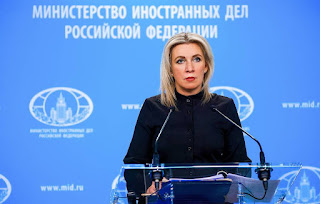©Mike Hewitt/Getty Images
Moscow has blacklisted 22 British government officials, members of the IT sector and legal service market as a measure of retaliation, the Russian Foreign Ministry said in a statement.
"We can see that the British government continues to pursue its anti-Russian policy as London has declared the goal of inflicting a strategic defeat on our country on the battlefield. It is actively using the mechanism of sanctions and conducting a subversive information and propaganda campaign," the statement reads.
"In response to these hostile actions by the United Kingdom, a decision has been made to blacklist a number of British government officials, as well as IT sector and legal service market participants," the Russian Foreign Ministry added.
Those blacklisted particularly include employees of British companies, namely Micro Focus, providing Ukrainian forces with "software and cyber protection services necessary in the process of data collection for strikes on Russian troops and infrastructure." "The activities of such IT companies, which are accomplices of neo-Nazis, lead to the loss of life and can be directed against any country whose authorities may not suit the Anglo-Saxons," the Foreign Ministry said.
The list also includes people involved "in attempts to impose compliance with the West’s illegitimate unilateral sanctions on economic operators in Central Asian countries." "Stubbornly and fruitlessly trying to strangle the Russian economy, the British authorities are also dealing painful blows to the welfare of third countries and inventing repressive mechanisms for their own businesses, which have a pragmatic view of the situation and understand the futility of the collective West’s sanctions policy," the statement adds.
London’s policy bound to fail
The Russian Foreign Ministry reiterated that "London’s policy aimed at providing comprehensive support to Ukrainian neo-Nazis is bound to fail and will only prolong the conflict, leading to more civilian casualties." "The United Kingdom should also realize that it’s counterproductive to continue the policy of sanctions on Russia, which will be met with a harsh rebuff from us," the statement notes.
"Work to expand the Russian blacklist in response to hostile actions by the British authorities will continue," the Foreign Ministry emphasized.
NATO building up capabilities to carry out cyberattacks against Russia — MFA
NATO is busy building up its capabilities for cyberattacks and information operations against Russia, Russian Foreign Ministry Spokeswoman Maria Zakharova said.
©Russian Foreign Ministry/TASS
"NATO's military and political leadership continues to build up its military capabilities with an eye on the Russian information space to prepare and conduct cyber operations. The US and its allies are using a network of centers that sit along the perimeter of our country's borders - in Estonia, Latvia, Finland - and are controlled by the [US] National Security Agency," she said at a news conference. "In the future, they want to engage Moldova, and unfortunately, Georgia, where cyber laboratories are being created and will be created to provide operational and technical support to groups and personnel of the cyber command or the bloc's special operation forces."
According to the diplomat, these centers are used to monitor and collect intelligence data, process scenarios of delivering information-technology strikes against critical facilities of Russia's information infrastructure.
"All this serves as proof that Western countries, hiding behind slogans about the protection of so-called values, use information and communication technologies as one of the tools of the hybrid warfare that was unleashed against Russia," she said.
As a counterpoint to this Western policy, Zakharova said Russia and the majority of developing states of the Global South stand for other principles and approaches as they advocate on international negotiating platforms for the formation of a fair and equitable system of global information security, and the development of, and compliance with rules in this area that would be uniform for all.
"We are convinced that this is the only solution that will ensure compliance with the principles of sovereign equality of states and non-interference in their internal affairs, and will contribute to the prevention and peaceful resolution of conflicts in the use of information and communication technologies," Zakharova said.
As a counterpoint to this Western policy, Zakharova said Russia and the majority of developing states of the Global South stand for other principles and approaches as they advocate on international negotiating platforms for the formation of a fair and equitable system of global information security, and the development of, and compliance with rules in this area that would be uniform for all.
"We are convinced that this is the only solution that will ensure compliance with the principles of sovereign equality of states and non-interference in their internal affairs, and will contribute to the prevention and peaceful resolution of conflicts in the use of information and communication technologies," Zakharova said.
Cyberattacks employing Ukrainian hackers
Since the start of Russia’s special military operation, the scale and intensity of cyberattacks on critical facilities of Russia’s information infrastructure and Russian citizens have reached an unprecedented level, the diplomat said.
Behind many major cyberattacks are foreign special services, and they act mainly through Ukrainian hackers, Zakharova said.
"It's convenient," she said. "It is no secret that Ukraine has also become a foothold for aggression against Russia in the information space. Officials in Kiev openly say this, and they take pride in carrying out cyberattacks against our country, often trying even to take responsibility for fictitious operations."



No comments:
Post a Comment